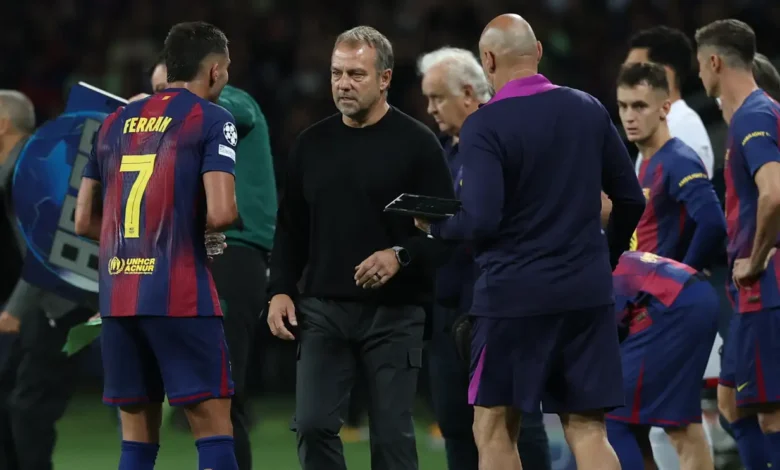Barcelona Makes History Despite Loss to PSG

Barcelona’s night against Paris Saint-Germain in the Champions League was not a night of joy for Blaugrana fans. The 2-1 defeat in a difficult encounter left a wound in the hearts of fans who had hoped for a triumphant comeback to bolster the team’s continental campaign. However, amidst the shadow of disappointment, a ray of hope emerged for an unprecedented historic achievement, as the men of German coach Hansi Flick succeeded in setting a new record that will remain etched in the club’s memory.
Despite the loss in the score, Barcelona achieved an achievement by scoring their (45)th consecutive match against their opponents. This exceptional record broke a record that had stood for decades, dating back to 1944, when the team scored in (44) consecutive matches. Ferran Torres’ goal against Paris was not enough to avoid defeat, but it was enough to give Barcelona a historic moment as important as the titles.
Since Hansi Flick took over the coaching staff, it has become clear that his philosophy is based on intense attack and high pressure. The German coach, known for his reliance on attacking intensity, brought that approach to Catalonia by employing an “attacking trio” supported by an advanced midfielder, creating a flexible offensive system capable of dismantling opponents’ lines.
This strategy not only yielded numerous goals, but also gave the team a variety of scoring opportunities. Barcelona no longer relies on a single star to make the difference; instead, goals have been distributed among 11 different players since the start of the season. This diversity reflects the team spirit instilled by Flick, with the team operating as a complete offensive unit.
In addition, there has been a noticeable improvement in the exploitation of set pieces. The team, which had suffered from weaknesses in corner kicks and crosses in recent years, now possesses an additional weapon with which to threaten any opponent.
From “Lluís Companys” to the Parisian night
The record didn’t come about by chance. Since the shocking 1-0 loss to Leganés in December 2024 at the “Lluís Companys” stadium, Barcelona has not been able to score. Regardless of the opponent or the competition, whether domestic league, Champions League, or friendly matches, the Catalan team’s goal was never immune to the Catalans’ attacks.
This consistent scoring streak wasn’t just a temporary improvement; it was a long-standing series that proved Flick had succeeded in restoring the attacking identity associated with Barcelona’s golden history, when the team was capable of scoring from any position and on any pitch.
Europe in Focus
The remarkable numbers didn’t stop at domestic competitions. In the Champions League, the competition that measures the strength of the big guns, Barcelona continued to score in every match under Flick’s leadership. This effectiveness against the continent’s toughest defenses reminds fans of the years of dominance, when the team converted almost every chance into a goal.
However, the fact that is not lost on the club’s fans is that numbers alone are not enough. Catalan fans are accustomed to equating joy with titles, and they know that the ultimate goal is to return to the European podium, a position the team has not enjoyed since 2015.
Comparison with Real Madrid
Despite the value of the new record, Barcelona is still far from the Spanish record held by its rival Real Madrid. During Zinedine Zidane’s golden era, between 2016 and 2018, Real Madrid managed to score in (73) consecutive matches, a record that was associated with the team’s most successful period when they won three consecutive Champions League titles.
This achievement was linked to the power of an unforgettable attacking trio: Gareth Bale, Karim Benzema, and Cristiano Ronaldo, who overwhelmed European defenses and ensured that Madrid never left a match empty-handed.
Globally, the record remains elusive, held by Argentine side River Plate, who scored in (93) consecutive matches between 1936 and 1939. This historic achievement spanned three full years, and no club in the world has been able to surpass it to date, remaining a testament to the eternal glory of Latin American football.
Between Numbers and Ambition
Barcelona today stands at a crossroads. On the one hand, it is recording individual and collective achievements in terms of numbers, confirming the return of offensive effectiveness and the development of the system under Flick’s leadership. On the other hand, major challenges still lie ahead: How can he turn these records into championships? And how can he combine offensive creativity with defensive solidity in crucial matches?
The defeat to Paris Saint-Germain was a wake-up call, but it didn’t erase the fact that Flick’s project is making confident strides in reshaping the team’s identity. Only the coming days will tell: Will Barcelona be content with the joy of scoring and the goalscoring numbers, or will this translate into a long-awaited return to continental glory?
